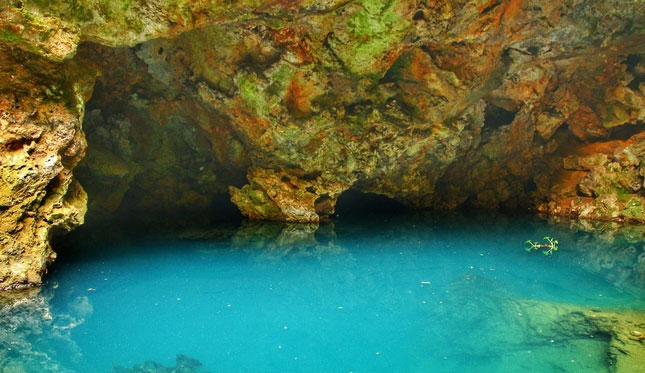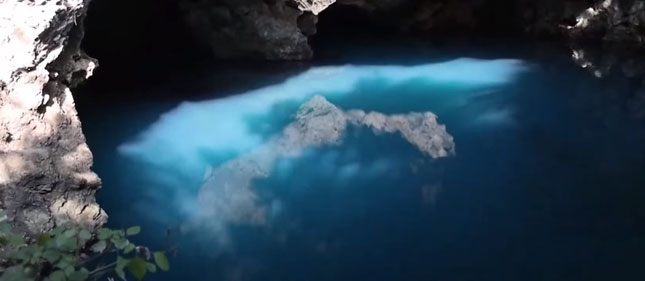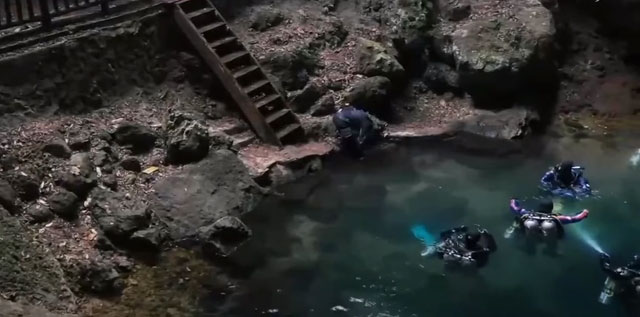The blue lake known as the 'long palace' in China hides the secret of an ancient and backward custom
Mai Chau city (Guangdong, China) has a natural water cave famous for its emerald green color, known as the 'long palace' on the ground - Luc Quat lake.
Possessing beautiful scenery, jade-like water, and being the only completely submerged cave in China, Luc Quat Lake not only attracts a large number of tourists to visit, but also has many craftsmen. Famous professional diving.
Skeletons under Luc Quat Lake
In November 2011, a group of people went to Luc Quat Lake to challenge diving to the bottom to see how deep the cave is.
But this ordeal has revealed a shocking secret deep at the bottom of the water cave. During the dive to the bottom, the group discovered many sets of remains. Because of the fear, the group of divers immediately surfaced and alerted the police.


The natural lake is famous for its emerald green color.
Police approached the scene, and invited professional divers to assist in collecting information and images of the bottom of the cave. Through testing, the police recorded 12 female skeletons under the water, found at a depth of 46m.
Forensic said that these people had sunk under Luc Quat Lake and struggled violently before dying. Around the remains were many long and heavy chains. That's why they struggled to no avail.
According to preliminary assessment, experts say that these women have been dead for a long time, not modern people
The police invited archaeologists to participate in the investigation. The result must have surprised the police. The skeletons of women in Luc Quat Lake are people who lived in the last years of the Qing Dynasty.
Based on bones alone, it is difficult to find out the truth, so experts can only investigate villages around the water cave area. Sure enough, the police found an 86-year-old woman living in the nearby area. Her story helped experts and police to uncover the dark history that lies beneath Luc Quat Lake with its blue water.
Revealing the secret of ancient punishment
The old woman recounted that at the end of the Qing Dynasty, there was a sect of the Ly family. This family is very influential in the locality.
The skeletons at the bottom of Luc Quat Lake are women of the Ly family, and are all accused of "not keeping virginity". In Ancient times, virginity was very important to women. At that time, women had no status, after marriage, they were completely dependent on the husband's family. If their husbands die, they have to keep frugality for the rest of their lives. According to the old concept, keeping frugality is maintaining purity and morality as a human being; Women must be faithful to their husbands.


Divers discovered many sets of remains at the bottom of Luc Quat Lake.
If they don't know how to keep their temper, but are discovered, they will be locked in a pig's cage, then wrapped with iron chains so that they can't get out. The villagers gathered around and cursed for a while, then threw the pig's basket into the water.
'Drowning a pig' is a family or village image used to punish unfaithful couples. However, the victim is usually a woman.
Influenced by the idea of respecting men and disrespecting women, a man can submit a concubine, but a widowed woman has to keep a secret for the rest of her life. If the widow was found to have committed adultery, she would certainly face the death penalty. As for the man, at most, only a few words were criticized.
In fact, this punishment does not necessarily have to use a pig's cage, but can still use other types of cages or cages such as chicken coops… This penalty of 'drowning the pig's basket' has another layer of meaning. It is to see that women who do not know how to keep their self-control have lost all dignity and personality.
This is one of the cruel, inhuman punishments applied to the small fate of women. At that time, the government could not intervene because they thought that this was a 'family matter'. Furthermore, the women were handled in a secret place where no one knew. On the other hand, the Qing government only 'takes care of each other', 'takes care of other people's own affairs'.
According to the 86-year-old old woman, Luc Quat lake is the place of punishment for the Ly family in Nham Tien village and other neighboring villages, specializing in executing people who violate the law and women who do not know how to keep their manners.
The punishment of being confined in a pig's basket and then submerged in the water was really cruel, and it was not until the Nationalist era that it was abolished.
- The ancient 'city' mystery at the bottom of the lake no one knows for thousands of years
- Found 16 right hands that were severed, buried in the ancient palace
- Found the 1,000-year-old Palestinian palace in Mexico
- Ruins of Qin Shihuang Palace surfaced on the beach
- Explore the magnificent Royal Palace of Japan
- The secret of 'the most lonely place in the earth'
- Turtle Lake and anecdote
- Palace of 1,000 years of the Khin dynasty in China
- 'Lake of the devil': Detects tremors at a depth of 4000m
- Unique architecture of the semi-submersible palace floating on the lake
- The 3000-year-old palace suspects King Solomon
- City of thousand years old at the bottom of the lake
 Biography of hero Vu A Dinh
Biography of hero Vu A Dinh History of hematology
History of hematology Who is Mr. Tam Da 'Phuc-Loc-Tho' and what does it mean?
Who is Mr. Tam Da 'Phuc-Loc-Tho' and what does it mean? Unbelievable facts about the history of the oil and gas industry: Gasoline used to be cheaper than water, so abundant that it had to be dumped into the river...
Unbelievable facts about the history of the oil and gas industry: Gasoline used to be cheaper than water, so abundant that it had to be dumped into the river...